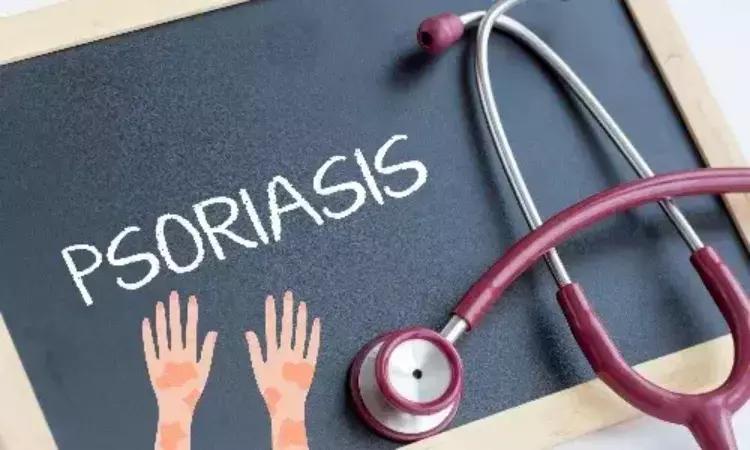Psoriasis Patients Under Biologic Treatment May Present With Paradoxical Eczema
- byDoctor News Daily Team
- 10 July, 2025
- 0 Comments
- 0 Mins

Biologic therapies have revolutionized the treatment landscape for plaque psoriasis, demonstrating efficacy in managing the condition. However, a novel study conducted across the UK and Ireland has unearthed a curious phenomenon associated with these treatments—paradoxical eczema. The study found that IL-23 inhibitors caused the lowest incidence of paradoxical eczema.
The study results were published in the journal JAMA Dermatology.
Also Read: Psoriasis patients may be at higher risk of developing chronic kidney disease
Biologic treatments administered for plaque psoriasis have been linked to the emergence of an atopic dermatitis (AD) phenotype, commonly referred to as paradoxical eczema, in certain patients. However, the specific risk factors contributing to this phenomenon remain unclear. Plaque psoriasis, characterized by an atopic dermatitis (AD) phenotype, poses intriguing questions about the interplay between biologics and skin-related outcomes.
The prospective cohort study, drawing on data from the British Association of Dermatologists Biologics and Immunomodulators Register, aimed to delve into the risk factors for paradoxical eczema caused by biologics and evaluate variations across different biologic classes. The research spanned from September 2007 to December 2022, capturing a significant cohort of adults undergoing biologic treatment for plaque psoriasis.
Findings:
Out of the 56,553 drug exposures analyzed, 24,997 from 13,699 participants formed the core of the investigation.
Surprisingly, only 1% of these exposures (273 cases) were linked to paradoxical eczema. This revelation underscores the complexity and rarity of the phenomenon, offering valuable insights into the safety profile of biologics in the context of psoriasis management.
The study examined the incidence rates of paradoxical eczema across various biological classes.
Results indicated a nuanced landscape, with IL-23 inhibitors standing out as associated with a lower risk compared to TNF inhibitors. These findings introduce a layer of specificity in understanding how different biologics may impact patients, contributing to the ongoing discourse on personalized treatment approaches.
Beyond biologic classes, the research identified several factors influencing the risk of paradoxical eczema. Age emerged as a notable factor, with increasing age correlating with a higher risk. Additionally, gender played a role, as females exhibited a higher risk compared to their male counterparts. A history of AD or hay fever also emerged as a significant contributor to an elevated risk profile.
The implications of this study extend beyond academia, providing actionable insights for healthcare practitioners involved in the management of psoriasis. Tailoring treatment plans based on individual patient characteristics, including age, gender, and medical history, becomes imperative in light of these findings.
Also Read: Rheumatoid arthritis patients on TNFi at high risk of developing psoriasis
While shedding light on the factors influencing paradoxical eczema, the researchers caution that further studies are needed to replicate and validate these findings. Psoriasis management is a dynamic field, and understanding the intricacies of biologic treatments is pivotal for optimizing outcomes and ensuring patient well-being.
In conclusion, the study not only unravels the enigma of paradoxical eczema but also advocates for a more nuanced and personalized approach to psoriasis treatment. As medical science continues to advance, such investigations contribute to the evolution of tailored therapeutic strategies, enhancing the overall quality of care for individuals navigating psoriasis and related conditions.
Further reading: Al-Janabi A, Alabas OA, Yiu ZZN, et al. Risk of Paradoxical Eczema in Patients Receiving Biologics for Psoriasis. JAMA Dermatol. Published online December 06, 2023. doi:10.1001/jamadermatol.2023.4846
Disclaimer: This website is designed for healthcare professionals and serves solely for informational purposes.
The content provided should not be interpreted as medical advice, diagnosis, treatment recommendations, prescriptions, or endorsements of specific medical practices. It is not a replacement for professional medical consultation or the expertise of a licensed healthcare provider.
Given the ever-evolving nature of medical science, we strive to keep our information accurate and up to date. However, we do not guarantee the completeness or accuracy of the content.
If you come across any inconsistencies, please reach out to us at
admin@doctornewsdaily.com.
We do not support or endorse medical opinions, treatments, or recommendations that contradict the advice of qualified healthcare professionals.
By using this website, you agree to our
Terms of Use,
Privacy Policy, and
Advertisement Policy.
For further details, please review our
Full Disclaimer.
Tags:
Recent News
Gum disease could silently cause serious brain dam...
- 03 November, 2025
Can Early-Day Fasting Significantly Boost Metaboli...
- 03 November, 2025
Delhi HC bars doctor from running medical centre d...
- 03 November, 2025
Phase III data for Gazyva/Gazyvaro show significan...
- 03 November, 2025
Daily Newsletter
Get all the top stories from Blogs to keep track.


0 Comments
Post a comment
No comments yet. Be the first to comment!